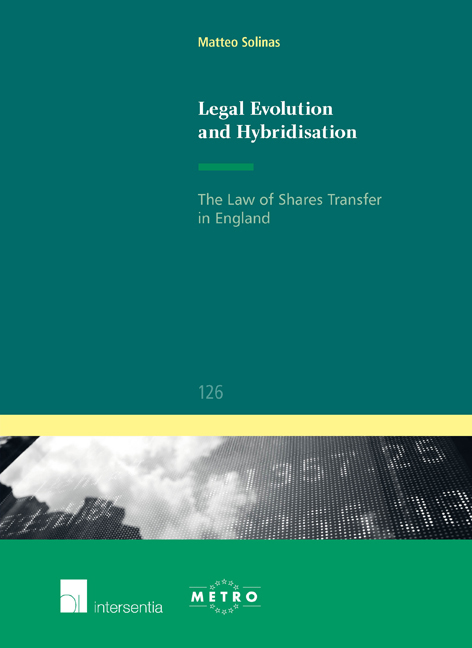Book contents
- Frontmatter
- Foreword
- Preface
- Acknowledgements
- Contents
- Table of Cases
- Introduction
- PART I THE IDEA OF HYBRIDITY IN COMPARATIVE LAW
- PART II THE CIRCULATION OF SHARES
- PART III THE TRANSFER OF (INTERESTS IN) SHARES
- Introduction to Part III
- Chapter 6 Indirect Holding and the Process of Legal Evolution
- Chapter 7 The Protection of the Innocent Transferee of Intermediated Shares
- Summary of Part III
- Conclusions
- Bibliography
- IUS COMMUNE EUROPAEUM
Introduction to Part III
from PART III - THE TRANSFER OF (INTERESTS IN) SHARES
Published online by Cambridge University Press: 22 November 2017
- Frontmatter
- Foreword
- Preface
- Acknowledgements
- Contents
- Table of Cases
- Introduction
- PART I THE IDEA OF HYBRIDITY IN COMPARATIVE LAW
- PART II THE CIRCULATION OF SHARES
- PART III THE TRANSFER OF (INTERESTS IN) SHARES
- Introduction to Part III
- Chapter 6 Indirect Holding and the Process of Legal Evolution
- Chapter 7 The Protection of the Innocent Transferee of Intermediated Shares
- Summary of Part III
- Conclusions
- Bibliography
- IUS COMMUNE EUROPAEUM
Summary
This Part focuses on the second leg of the case study on comparative jurisprudence according to the scheme outlined at the end of Part I. By looking at the evolution of the methods by which shares are transferred in financial markets, it considers prospectively (de iure condendo) certain themes on cultural interaction originated in the postcolonial debate. In essence, Part III examines the limits of current practice of holding and disposition of shares through intermediaries and discusses the initiatives for modernising the existing legal framework. In doing so, it suggests that the concept of hybridisation presented in Part I and discussed in Part II with respect to the non-hegemonic scheme of borrowing, also applies outside that specific context.
The inquiry is specifically grounded on the process of formation and possible implementation in the UK of the UNIDROIT Convention on Substantive Rules for Intermediated Securities adopted by the diplomatic conference in Geneva on 9 October 2009 (hereinafter, the ‘Geneva Securities Convention’) as the most advanced and sophisticated legislative achievement in the area of the circulation of indirectly held securities. It is argued in this Part that, by analogy to the pattern of legal change based on borrowing, the model arising from a regulated mechanism of harmonisation set out by the contributions of delegates and national experts at international sessions and diplomatic conferences also involves a form of hybridisation. This pattern (unlike the one based on borrowing) consists of a two-step process where cultural interactions occur both at the formation of the international instrument and at the time of its hegemonic implementation in the domestic legal framework. In the light of the existing uncertainty on whether the Geneva Securities Convention will be ratified in the UK, only the first step can be properly addressed in this study. With respect to the second one, supportive reference to the arguments on hybridisation will be made by referring to comparable paradigms.
Part III is divided into two chapters. They consider at different levels and with a variety of emphases the evolution of law in the area of holding and transfer of shares in financial markets.
Chapter 6 takes a broad perspective. As a preliminary matter it tackles the economic themes underlying the evolution of market practice.
- Type
- Chapter
- Information
- Legal Evolution and Hybridisation , pp. 139 - 140Publisher: IntersentiaPrint publication year: 2014

